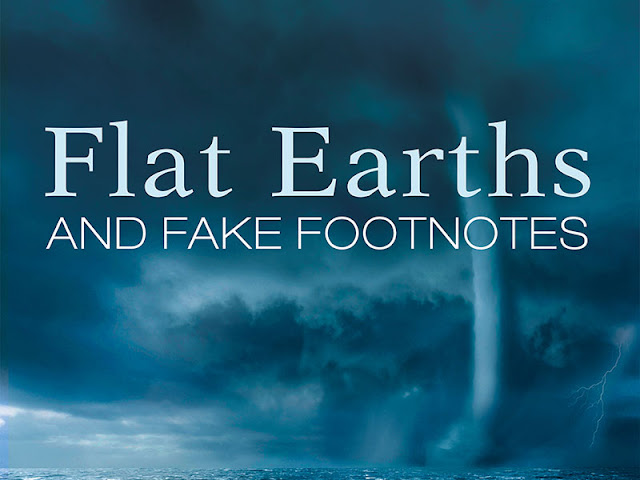Are science and theology hopelessly at odds?
This post takes a brief look at Flat Earths and Fake Footnotes, the Strange Tale of How the Conflict of Science and Christianity Was Written Into History by Derrick Peterson, adjunct professor at Multnomah University and Seminary.
As Peterson demonstrates, there remains within modern culture (both secular and religious circles) the false narrative that science and theology are hopelessly at odds. Calling this narrative the warfare thesis, Peterson asks, "Where did it come from? How did it take hold? What myths were used, and why? How was it uncovered and eventually overturned in academia? (p. ix).
godly [Christian] individuals were... active participants in history, directing their efforts towards the establishment of those conditions that would usher in the final age of the world... to do ‘science’ was to participate in Christ’s restoration of what Adam lost. (p. 44)
In that era, doing 'science' and doing 'religion' were largely inseparable--quite unlike how things are in our modern, secular era where "the tendency of interpreters... [is] to downplay, extract, hinder, or otherwise work contrary to the religious and theological dimension.” (p. 47). False interpretations of the history of the relationship of science and theology have been with us for a long time. As Peterson notes, they have wandered among us like "ghosts...living a shadowy afterlife haunting textbooks, popular histories, and pop culture at large" (p. 48). The net result is that false narratives took hold, perpetuating an assumption of a warfare between science and theology that remains in our day. As a result, within secular circles, theology has been entirely discounted or at least marginalized, and within religions circles, science has been unnecessarily demonized and feared.
Though the false narratives of the warfare thesis have a deep hold in our culture, the rejection-marginalization of the contribution of theology to the development of science and western culture is beginning to be questioned as scholars of the history of science begin to uncover evidence that theology did, indeed, play a significant and helpful role in the development of science. For example, historian Michael Buckley has commented that a great deal of irony is encountered when one reads accounts in popular histories of an antagonism between religion in science. According to Buckley, such antagonism was "precisely what the problem was not!" The sciences, Peterson notes, "did not oppose religious convictions, they supported them. Indeed, they subsumed theology, and theologians accepted with relief and gratitude this assumption of religious foundations by Cartesian first philosophy and Newtonian mechanics." Peterson continues:
As history unfolded, the problem was not warfare [between religion and science] but more often the various competing harmonies that had been struck too deeply between science and religion. Thus when aspects of the science changed, the religion that was so deeply wedded to them in many instances appeared to become obsolete as well.... Theology and religion sanctioned, justified, and unified scientific pursuits, while also providing frameworks for selection of both method and theology. Even a list of concepts which science uses--nature, cause, space, time, matter, experiment, motion, contingency, law, and so forth--involves a series of complex histories that deeply involved theological matters that survive--even if only in an implicit way--in scientific discourse today. (pp. 44-45)
Despite growing awareness of the falsity of the warfare narrative, a "process of de-theologization" (p. 46) continues in our day--a process that involves intentional or sometimes unintentional historical amnesia concerning the role of religion in the early development of science. This process has led to the deletion from "the breadth of our memory" of an awareness that "theology and religion were key components in the rise of science" (p. 48). Viewing these deletions, many historians in our day have come to realize that the warfare narrative was written into history in order "to drive the stark contrasts of war like science vs. religion, or reason vs. faith" (p. 48). Such deletions included the down-playing of such facts as Newton and Galileo being zealously Christian. Newton's work doing natural philosophy included reflections upon the place and nature of God.
Sadly, the so-called "scientific revolution" of the 16th and 17th centuries included the separation of science from religion, with science coming to be viewed as a victory over religion. Before that revolution, theology was considered the "queen" of all sciences, but now it was "not even allowed on the premises.... A once Christian culture [had] become a scientific one" (p. 52). But all was not lost. For example,
theology... had a deep impact upon Newton's scientific work. Indeed, the remarkable success of the Principia...in restoring true natural philosophy was motivated on Newton's part by a fervent quest where he sought the border where natural and divine principles met and fused. (p. 53)
Throughout Flat Earths and Fake Footnotes, which I encourage you to read, Derrick Peterson offers multiple, well-documented accounts showing how and why the warfare narrative took hold in modern culture and why it is more fiction than fact. Did conflicts between religion and science exist? Yes, but those conflicts have often been exaggerated, whereas points of continuity and mutuality between science and theology have often (whether intentionally or unintentionally) been overlooked entirely or, at least, downplayed. Peterson carefully examines the historical record and goes a long way toward setting it straight. In doing so, he has given an important gift to both theology and science, helping open channels for a more cooperative, respectful, fact-based dialogue. There remains much work to do.
